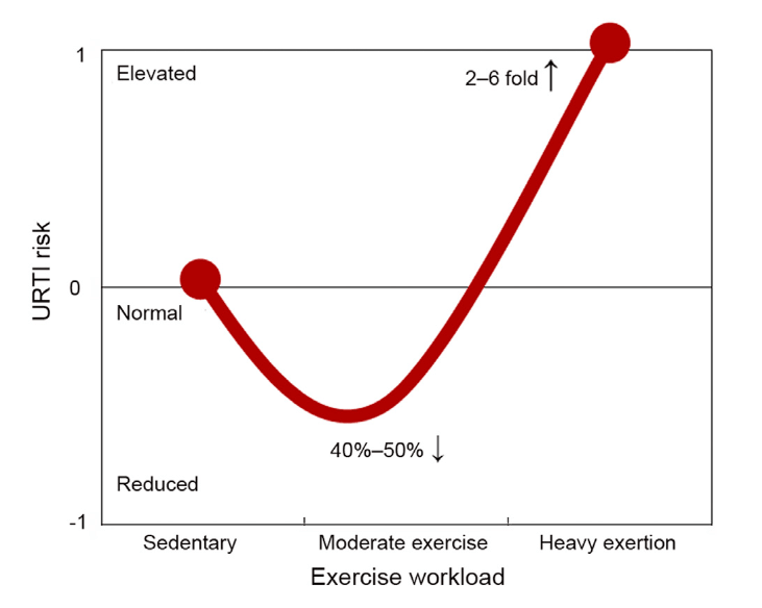
Exercise and Immunity
Exercise and Immunity
How are Exercise and Immunity Related?
The acute and chronic effects of exercise have an influence on our immune system. Acute exercise (moderate to vigorous intensity <60mins) is seen to be important in stimulating the ongoing exchange of immune cells in our body. Regular exercise has an accumulative (chronic) effect by enhancing cell immune defense.
Very high training loads places stress on our bodies. Prolonged and intense exercise can cause transient immune dysfunction by decreasing immune cell capacity. For example, research has seen an increase in illness in runners shortly after they’ve run a marathon. Other stressors such as depression or anxiety, lack of sleep and poor nutrition also has an impact on immune health.
There is lots of research to support the inverse relationship between moderate exercise training and the incidence of upper respiratory tract infections (URTI) such as influenza and pneumonia (see the J-curve model in the graph below).

What should we do?
The world health organisation has written global recommendations on physical activity for health to prevent conditions such as heart disease, obesity, cancer, diabetes, osteoarthritis and back pain. By undertaking the recommended levels of physical activity, we dramatically reduce our risk of chronic disease, musculoskeletal injury and improve psychological wellbeing.
These recommendations vary across age groups:
- 5-17 years old: should accumulate at least 60 minutes of moderate to vigorous intensity physical activity daily. Activities that include those that strengthen muscle and bone should be undertaken at least 3 times per week.
- 18-64 years old – should do at least 150 mins of moderate intensity physical activity each week. Muscle strengthening should be done involving major muscle groups on 2 or more days a week.
- 65+ years old – should do at least 150mins of moderate intensity physical activity each week. This group should also include balance exercises 3 or more days per week, and strength activities on 2 or more days a week.
Our top tips for getting the exercise and immune system balance right:
- If you’re not already active, we don’t want you to get injured! Visit our Duncraig Physio clinic to discuss an an appropriate starting point. Avoid big spikes in activity and gradually build up.
- Avoid training when ill
- Use stress management techniques and coping strategies that help to reduce stress
- Get good quality sleep and a well-balanced diet
- Stay up to date with guidelines and exercise within the social distancing rules of your area
References
Nieman, D. C., Henson, D. A., Austin, M. D., & Sha, W. (2010). Upper respiratory tract infection is reduced in physically fit and active adults. British Journal of Sports Medicine, 45(12), 987–992.
Nieman, D. C., & Wentz, L. M. (2018). The compelling link between physical activity and the body’s defense system. Journal of Sport and Health Science.doi:10.1016/j.jshs.2018.09.009
World Health Organization (2010). Global recommendations on physical activity for health.